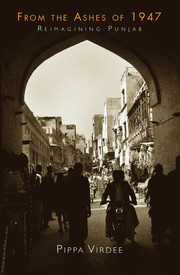Book contents
- Frontmatter
- Contents
- List of Photographs
- List of Maps and Tables
- List of Excerpts
- List of Abbreviations
- Glossary
- Acknowledgements
- Preface: Memories Create History
- 1 Partitioned Lands, Partitioned Histories
- 2 The Treasure within the Five Rivers
- 3 Handing Over the Reigns
- 4 Violence, Migration and the Making of the Refugee
- 5 Sacred Malerkotla
- 6 Migrating to the Promised Land: A Tale of Two Cities
- 7 From Refugee to Citizen
- 8 Cleansing Hearts and Minds
- 9 Lost Innocence and Sold Honour
- 10 Dreams, Memories and Legacies
- Select Bibliography
- Index
6 - Migrating to the Promised Land: A Tale of Two Cities
Published online by Cambridge University Press: 05 July 2018
- Frontmatter
- Contents
- List of Photographs
- List of Maps and Tables
- List of Excerpts
- List of Abbreviations
- Glossary
- Acknowledgements
- Preface: Memories Create History
- 1 Partitioned Lands, Partitioned Histories
- 2 The Treasure within the Five Rivers
- 3 Handing Over the Reigns
- 4 Violence, Migration and the Making of the Refugee
- 5 Sacred Malerkotla
- 6 Migrating to the Promised Land: A Tale of Two Cities
- 7 From Refugee to Citizen
- 8 Cleansing Hearts and Minds
- 9 Lost Innocence and Sold Honour
- 10 Dreams, Memories and Legacies
- Select Bibliography
- Index
Summary
As people left, abandoning their homes, land and their earthly possessions, they did so in the hope of either returning once the violence had settled down or in the hope of a new ‘promised land’. Making that momentous decision to abandon everything they had known previously and leave required courage but many people did so under pressure due to the ensuing violence and not because of choice. Recent research has begun to expose the human tragedy of this migration process and the differential migrant experiences. Moreover, the conflicts between the state and the individuals are clearly visible. Little is known about why urban migrants, who unlike agriculturalists were not directed by the state, settled where they did. Was this because of former business contacts or family connections in a locality? Did they follow the lead of relatives who had already completed their journeys in a kind of chain migration? Was it purely chance, arriving at the ‘wrong’ railway station that ended their migration? The journey to the ‘promised land’ was filled with uncertainty and these questions are poorly understood. But individual accounts of migration based on research in Ludhiana and Lyallpur help us in addressing some of the issues raised by these questions.
These two localities provide a comparative dimension to experiences of migration in both East and West Punjab. Both Ludhiana and Lyallpur experienced rapid growth in the post-partition period, which in part can be attributed to the refugee influx and will be examined in greater detail in the next chapter. Historically, there were patterns of migration between Ludhiana and Lyallpur even during the colonial era when the canal colonies were constructed. This pattern of colonial migration has in turn influenced the partition-related movements. When families were fleeing, the state was hardly in control and so people utilised their own pre-existing family and business connections in settling down. This is an area that is hardly explored in Partition Studies. In the vast landscape of Punjab, the story of these two cities is important in trying to understand the transformation of land, space and people from the colonial to the post-colonial. These cities and their people tell a story, which resonates not just within its metropolis boundaries but they speak of the wider transformation of two nation-states.
- Type
- Chapter
- Information
- From the Ashes of 1947Reimagining Punjab, pp. 102 - 131Publisher: Cambridge University PressPrint publication year: 2017



